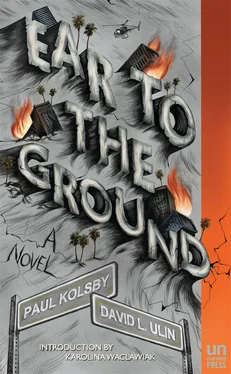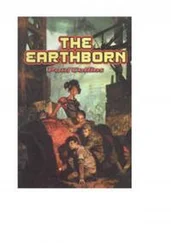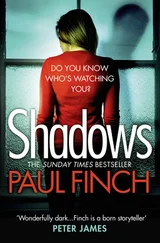The movie had opened on 2,900 screens on December 29, to mixed reviews. Janet Maslin of The New York Times called it a provocative concept with “Escheresque complexity,” but she also said it was “uneven in tone.” Gene Shalit, who loves everything, said it was the “scariest movie ever.” Then again, Peter Travers, from Rolling Stone, referred to it as “history’s most egregious waste of film stock.” Matters were worsened by that day’s Chicago Tribune, which ran a feature discussing the merits of capitalizing on disaster, indirectly accusing Warner Brothers of a bogus collusion with the Center for Earthquake Studies: “How Schlock Science Sells Seats.”
The fact remained that no earthquake had come. And Ethan Carson didn’t need MOVIEGROSS to spell it out: It was a crapshoot. In the absence of their “marketing earthquake,” they had little chance of making money. Losing less became his mantra, and soon after Bridge Bridges had been made comfortable, Ethan poured his first bourbon.
Having slept until noon without any intention of stopping by Ethan’s (he’d been invited out of necessity), Ian Marcus had a hankering for a Big Mac and Shake-’em-Up Shake. Mired in negativity and despair, he hadn’t called anyone back for two weeks. His friends, he was certain, were abandoning him. Even his mother had asked him if he’d “copied off that other boy.”
Still, Ian found solace seeing his name on various promotions connected with Ear to the Ground: in the newspaper, on billboards, television, and at McDonald’s. “Written by Ian Marcus,” it said, and it was true. How hard it was, though, to know where the ideas came from. If Ian thought back to that night at Damiano’s, he still couldn’t say whether Jon Kravitz had actually invented plot, or had simply led Ian to certain conclusions.
Ian drove to Mann’s Chinese, showed the manager his Writers Guild card, and walked into an afternoon screening of Ear to the Ground. He watched without bias and, along with a highly excited audience, truly enjoyed the movie. Bridge Bridges was wonderful, he thought. The laughs were in all the right places, and there was even applause as the closing credits rolled.
Ian was hopeful again. He strolled down Hollywood Boulevard, along the Walk of Fame and, as he happened past Pearl Bailey’s star, something came to him: “The Lord giveth, and the Lord taketh away.” Giveth and Taketh. He jumped into his car and raced home.
Funny how an idea comes like a seed. A seedling, an inspiration. By the time Ian reached his desk, he’d developed a protagonist and a story line. How simple it was: the man who’d lost everything. He lit a joint and, four hours later, had fourteen pages of a new screenplay.
At first, Ethan Carson thought the man from Landmark Theaters Dallas had miscalculated. He was certain that, instead of a weekend figure, the man was quoting for the entire week. Ethan immediately called someone in marketing at Warner Brothers and found that, indeed, they were doing serious business in Dallas. Ditto, Boston and Philadelphia, Seattle and Portland. Chicago had been slow Saturday afternoon, but had picked up, selling out its three o’clock matinees. New York held steady. The only competition was a film directed toward black women, Holding It In.
Ear to the Ground, it appeared, had legs a mile long. It didn’t drop off at all, would do $36 million in its second week, for a “cume” of $73 million, and would likely do $550 million globally. Ethan became graceful and buoyant when he received Bob Semel at the door, and by six o’clock there were two hundred people at the Carson house, drinking enough champagne to float the Queen Mary.
HENRY GRANT HAD NO INTENTION OF MOVING TO TUCSON. He’d been there once, and it wasn’t his kind of town. Emma talked about it like it was the Promised Land, but to Henry it was just a flat, ugly place where the bars closed early. He kept his mouth shut, though, until they reached the intersection of the 10 and the 15, where he took the road to Vegas.
“Think of it like a vacation,” he told Emma, when she protested. “Dorothy’ll love it.”
Emma slid away from him, leaning up against her door so hard she had to press down the lock. “I’m sure that’s exactly what you have in mind.”
“It’ll be fun,” he said, and floored the pickup, trying to make a little time.
That night, after Emma and Dorothy were asleep in their cheap motel room, Henry took a drive down the Strip. The desert sky was dark, but the lights of Vegas sparkled against it like stars come to earth. In the lobby of the Mirage, dolphins swam and trees reached up to an artificial sky, and he thought what a kick Dorothy would get out of the place. Then Henry heard the ching-ching-ching of the casino, and left all sense of family behind.
He started with five dollar blackjack, where he found a seat at the center of the table, next to a postal worker from Kansas who was in the process of losing his rent. He won his first hand when the dealer went bust on a sixteen, and the second when he drew a twenty-one. Easy. By the time the blonde cocktail waitress — who was wearing a cheerleader’s outfit — brought him his third free beer, Henry had seven hundred in winnings. So he decided on a bit of a challenge.
Henry had never really understood craps, but it seemed simple enough. Instead of cards, it was dice. Besides, it was where the action was. So he threw down a couple of hundred dollar chips, ordered a bourbon, and set about learning the ropes. A pretty redhead blew three times on the dice before she threw them, her diamond bracelet jangling and catching the light.
The game moved fast. Nickel come; nickel go. Play the field. Hardways. Make the number. Easy as pie. And by three AM, when his education had cost him two thousand dollars, he jumped in the pickup loaded with his family’s possessions and went back to his motel room on tip-toes, for a little more tuition money.
He’d learned enough to know the odds were with the house, always with the house. But when he played “Don’t Pass,” the house suddenly got cold. Sick of pulling out a hundred here and a hundred there, he bought five grand worth of chips, thinking the stack would bring him confidence and luck. Besides, he would never bet it all. That was for suckers. When it was his turn to roll, he bet against himself, and, dumb luck, he rolled beautifully.
An hour later, Henry sat in a men’s room stall and counted his money. Ten thousand was gone. He was drunk, his mouth dry. No more craps, he thought. He sat back against the wall. His heart fluttered, and he hoped it would attack him. “Die, Henry, die!” he murmured to himself. No such luck.
But after a while, back out at the bar, Henry had an inspiration. Or rather a conversation, with a middle-aged man, about how the 49ers — who would face the Green Bay Packers in the playoffs the following day — couldn’t lose. “Y’got the best coached organization in the history of professional sports,” the man said. “And they got two other important things. The best offense in the league, and the best defense, too.”
Yeah, Henry thought. The 49ers. The 49ers are a sure thing.
So on his way out of the casino at six-forty-five in the morning, Henry laid his money down. Ten thousand on the San Francisco 49ers. If he won, he’d break even. The spread was ten points, but the Niners always won big in the playoffs. And, points or no points, only a fool would bet Green Bay. He drove back to the motel and crept into bed.
Six hours later, at the end of the first quarter, the score was 14-0, Packers.
“Why do we have to stay here and watch football?” Emma wanted to know.
Читать дальше












